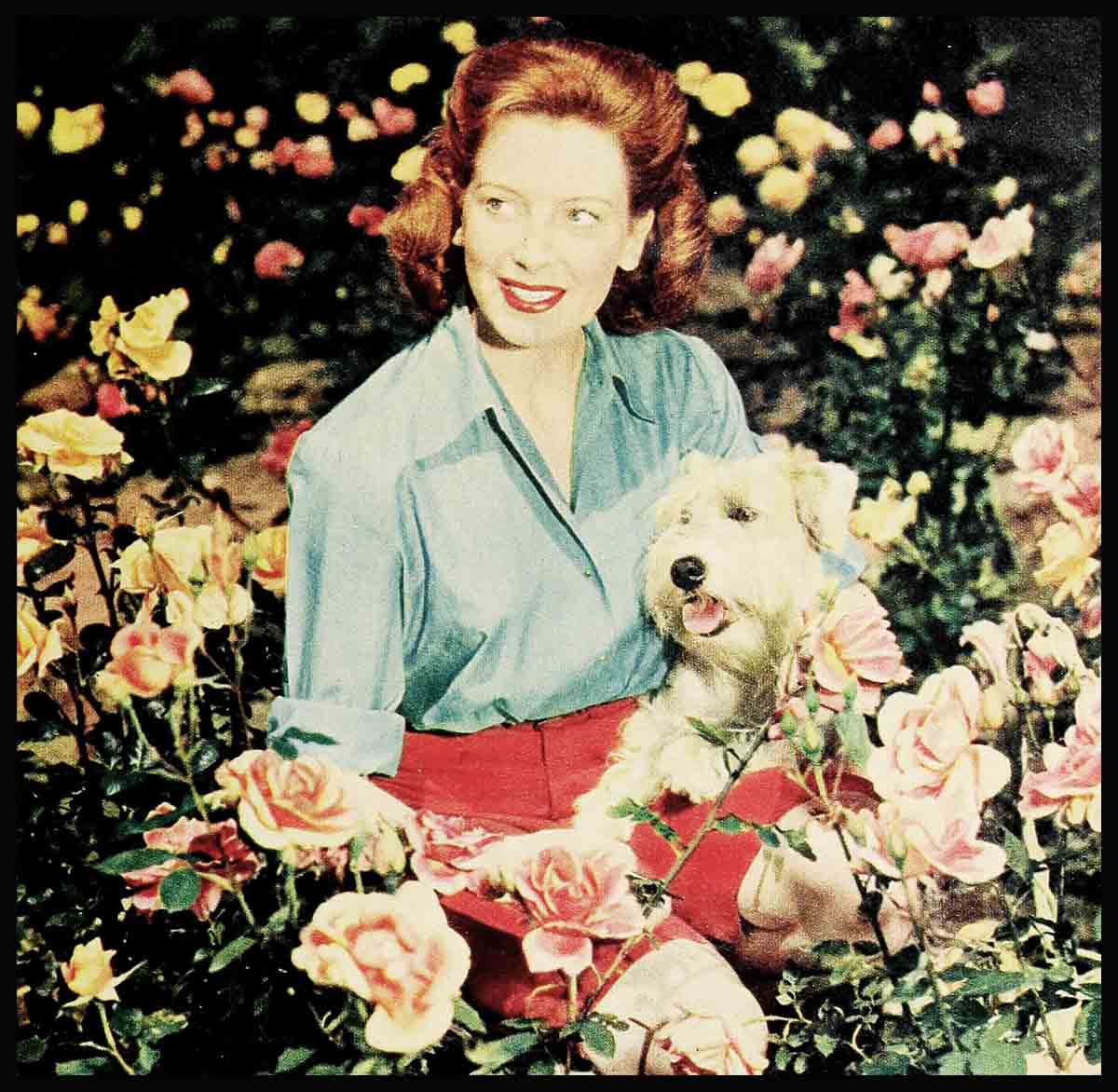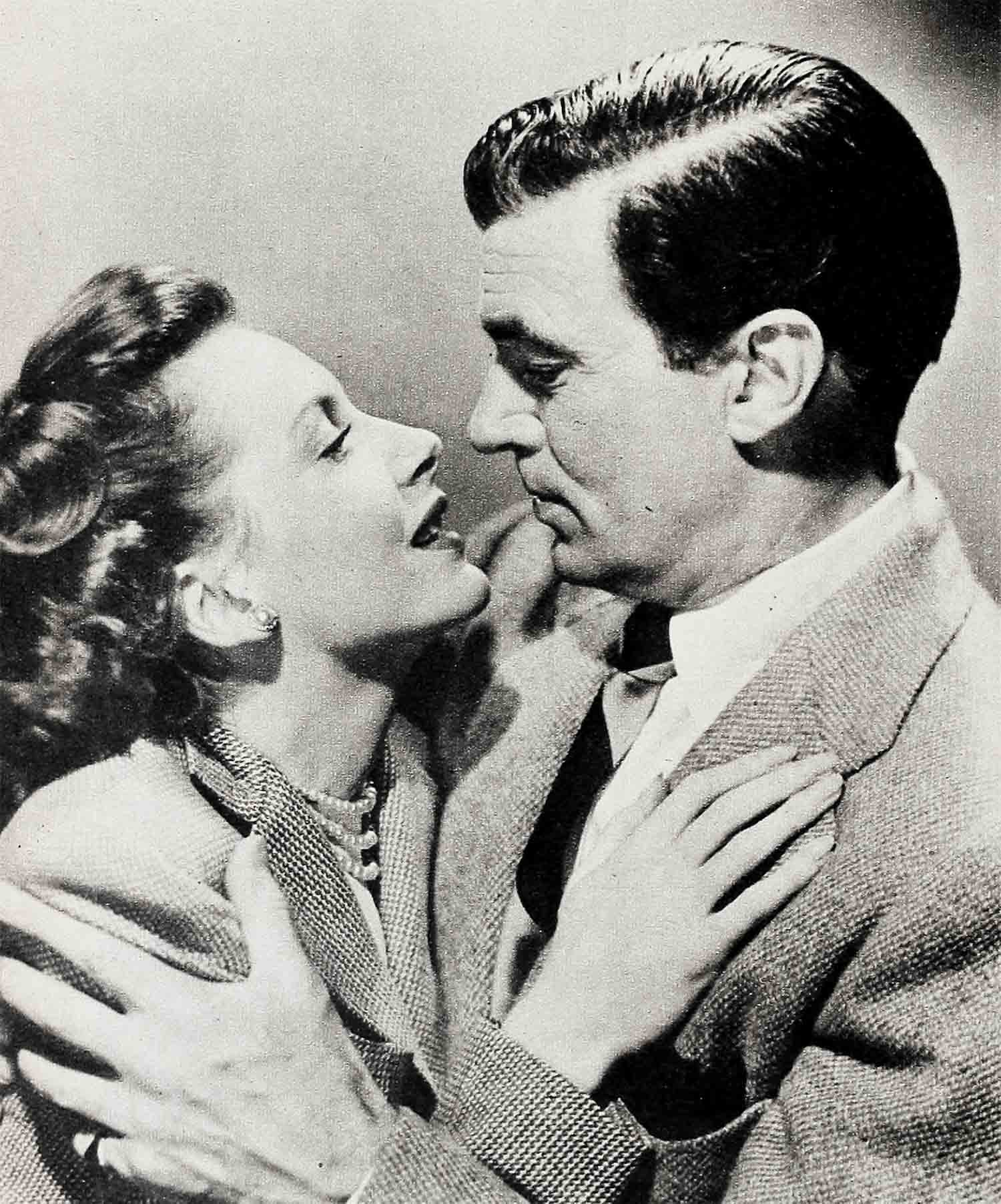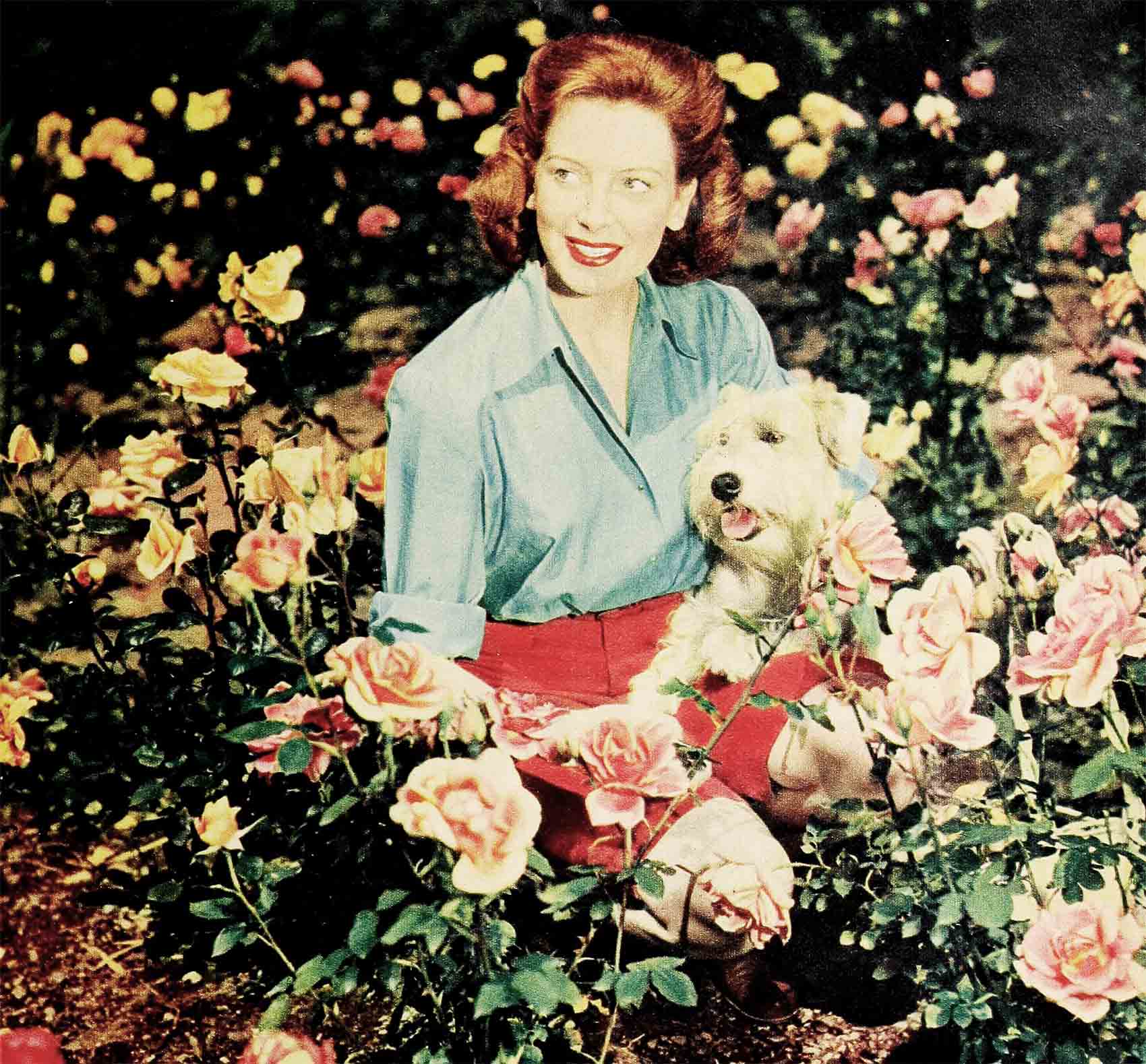
That Imported Feeling—Deborah Kerr
I’m gaining ground. Yes I am. No longer do I ask visitors to my home if they would “care for a cup of Pepsi Cola?” (Somehow I had got the impression that a “coke” to an American was like tea to an Englishman.)
Nor am I astonished any more if some girl happens to admire a dress I am wearing at a party, and bursts out, “Oh, where did you get it and how much did it cost?” Not at all astonished, even if people. don’t ask that sort of question, ever, in England. I’ve learned to reply, “Oh, it’s just a little thing I picked up—I don’t remember where the shop was exactly.” (Do I want her to turn up in the very same number? I don’t.)
It was not until the Atlantic Ocean had done its honor best to toss me clear off the Queen Elizabeth, and we had finally arrived at the Metro-Goldwyn-Mayer studios in Hollywood—after taking in New York in a three-day snatch and gulp—that I first had that “imported” feeling creep over me. I was sitting in the office of Mr. Louis B. Mayer and he was pressing a series of buzzers on his desk. Every time he pushed a button, another executive would come in, and I would be presented.
I began to feel like some bit of merchandise, a piece of porcelain, say, that the company had imported from abroad at great cost and which was now being closely inspected for possible flaws. After all, there was a bit of to-do and expense getting me there. I thought of the various M-G-M delegations which had met us at every boat and train transfer point en route and treated us exactly as if we had signs attached to ourselves reading: Handle With Care! Use No Hooks!
Sitting there in Mr, Mayer’s office, a growing nervousness began to overwhelm me. I wanted to jump up and (while making for the nearest exit) cry out, “No, no, gentlemen! I know I’m not what you counted on. There’s been a slight mistake, I’m sure. Ha, ha! The only person I might possibly be of some importance to is my husband, Tony—I think. If you don’t mind—he’s waiting just out in the hall—I’ll run out to him and we’ll sail back home. Cheerio, and thanks so much for the boat trip!”
I managed to restrain myself and did my best to be elegant. I know now I needn’t have worried, and that I misjudged Mr. Mayer and the other gentlemen. They were just trying to be friendly. All the same, it’s a good thing none of them uttered so much as a slight “Boo!” at me. I would have run out screaming to Tony!
When I first got word in England that I was to sail for New York, all my friends said, “Oh, you traitor! Running off to America to stuff yourself with steak and bananas! Why couldn’t it have been me?” Later on, when our ocean crossing proved so rough, I wished many times that it had been they instead—or at least that they hadn’t mentioned steak.
The first member of my family to hear the news about my Hollywood contract was my brother, Teddy, who is just twenty-one but right in the old English tradition. When I told him, he grunted, “H’m,” and stopped there, because that’s where he always stops. Right after he grunts, “H’m!”

bon voyage . . .
So, with this fervid sentiment ringing in my ears, I started to get some clothes for the voyage. In ration-ridden England that is a problem. I even had to storm the coupon-coffers of such distant ties as in-laws, cousins and a great aunt of Tony’s.
By the time I was ready to board ship I had (besides my usual “drabs”) two tailored suits and two cocktail dresses. That may not sound like much to some of you, but after eight years of war and post-war austerity living in England, it was a lush wardrobe as far as I was concerned!
All across the Atlantic, Tony and I made plans on how we would spend our few days in New York before getting aboard the train for California. We felt a bit bad at not knowing anyone in New York who might meet us and show us how to get about. Simple little tots, we were!
From the moment our boat docked in New York—we were gathered up by a welcome committee from M-G-M who not only attended to such matters as clearing customs and getting porters, but seemed to have telepathic insight into our every wish. I don’t remember now how many there were in the committee, but I do recall there were two Cadillacs to tow us about. Wherever we went, to our suite in the Waldorf, to the theater (and best seats for any show we named) or just sightseeing—we went in two Cadillacs.
“Why two cars, do you suppose, Tony?” I asked one night, as I sat with him in one of them and looked back at the other following behind. After all, Tony should know about such things. As an RAF pilot he had been in (or over) 32 countries. “Is it the American way of playing safe, in case one car has motor trouble?”
“Not at all,” he replied, with the air of a seasoned traveler. “The second car is there in case we drop anything. It will pick it up.”
New York was exhilarating; a taller, faster-moving, more compact, strange-sounding London. I can’t wait to get back to it. So was Chicago, even if we only had three hours there between trains. Most of that three hours was. taken up with a visit to the Museum of Art on Michigan Boulevard, and when we stopped in front of the building, Tony had a hard time convincing me that the two great stone lions which guard the entrance weren’t another welcoming touch put there by M-G-M to make me feel I was back in London. They did look just like the British lions at the foot of Nelson’s statue in Trafalgar Square.
And then, the immensity of America, that you only get to feel after you leave Chicago. The endless plains, the way the mountains suddenly loom up to crowd the horizon and then the sudden break of the whole scene into sagebrush-studded desert! I just couldn’t get over it!
It affected Tony as well. He would catch my eye, and shrug in helplessness, as much as to say this country is too utterly big, too majestic to joke about or comment on intelligently. All you could do was sit and look and wonder.
By the time we arrived in California (to be greeted by those two Cadillacs again) and-were swirled off to our hotel, the impressions of the trip were crowding my mind in confusion.
But the next morning, when Tony and I, all by ourselves, started out for our first call on the studio—that was something else again. After all the well-planned organization behind our trip, the reception committees, the great pains the studio took to bring us 7,000 miles to its gates—it looked for a while, that morning, as if those gates would not open to us!
“Who did you say you were?” asked the policeman at the entrance, sternly.
“Deborah Kerr,” I said weakly, and felt just like a small boy caught in the act of sneaking into a football match.
The policeman consulted his list. “I don’t see where we have any Deborah Kerr working here!” he declared, accusingly.
He went to his telephone and rang up somebody. He got nowhere. with his first call so he made another. And then another. Each time he had to explain the whole story all over again, and each time his eyes would study me over the telephone and I felt terribly guilty. Then, finally, somebody gave me their blessing (or perhaps just tossed a coin and it came out in my favor) and we were waved in.
The feeling of being a new pupil at school persisted for a long time at the studio; you know, walking around with a consciousness of being in strange surroundings, peeking around corners or the few faces you knew in the place—and feeling so utterly grateful when you do!
It’s been told before, but I think it bears repeating—how I got to meet Clark Gable, with whom I starred in my first American picture, The Hucksters. I was introduced to him at the studio, but not by any of its officials; instead, by my own husband! Imagine Tony not ever telling me that he and Clark were old friends, having worked together when Clark was a member of the U. S. Army Air Force in England!
We were in Mr. Mayer’s office when Clark strode in. I took a quick breath and prepared to be my most charming self, but before anyone could say anything, Clark seemed to be making straight for me, with his hand outstretched. “Goodness!” I thought. “Isn’t he going to wait for an introduction?”
And then he went right by (leaving me with mouth open) and was shaking hands with Tony. I waited like a good little girl, until they were through, and could turn to me.

studio-fright blues . . .
Of course, I was nervous when I started to work at the studio, and everyone tried to buck me up. But the man who really did the job was a great giant of a prop-hand on the set of The Hucksters. He was about 6‘ 4” and nearly that in width, and all during the first few weeks of the picture, filled me with dismay because of a scowl that never left his face. I was certain he had heard the English were very snooty, and no matter how friendly I tried to be, he just wasn’t going to like me. Then, one afternoon at four, he stopped at a chair where I was sitting.
“You drink tea?”
“Why, yes,” I replied, looking up. “In fact, I’ve been brought up on—” but he was gone, and my words hung in midair. I had never had anyone do anything so rude to me before. I was sitting there, silently boiling, when I saw him re-appear. Held by the tips of the fingers of one big ham of a hand was a dainty cup and saucer, from which arose an aroma that struck home at the very first whiff. It was tea. Delicious tea!
“H’yar!” he said, or something that sounded like that. And he stalked away. But he was back the next afternoon, and every afternoon at four thereafter, all during The Hucksters, and If Winter’ Comes, my picture with Walter Pidgeon. That prop man was my first real conquest in America, and I shall always be grateful to him for what he did for me. It wasn’t just the tea. It was the feeling of self-confidence he gave me.
It’s a wonderful country, and I’m having a wonderful time. I’m almost getting over feeling guilty whenever I sit down to a full course meal, for none of which anyone had to queue up (as we do in England) and from which nothing is missing (as almost everything tasty is in England these days).
I’m even getting used to. the personal advice which everyone here seems to dispense freely; what to do with your money, how to live, where to live. You share your life with so many others here that it is filled with more significance than before.
“You really must go to Palm Springs for! weekends! Everyone does!”
“You must get your hair done at Madame Tugantwist, you simply must!”
“Oh, don’t buy a house, build!” Or, “Don’t build with materials so high, buy!” Or, “Don’t build or buy, rent!”
Tony and I were looking for a house, and once when we were with a group of people someone mentioned one that was for sale. “Oh, no!” countered somebody else. “That house is too old.”
I picked up my ears. That sounded interesting. Maybe it was one of those places that reached back to the Spanish era in California. “ How old is it?” I asked.
“Oh, dreadfully old,” I was told. “Nearly fifteen years!”
I almost collapsed. The last home I lived in was in Sussex, England, and it dated back to the Sixteenth Century!
Yes, I love California, but more so because of something that happened the other day.We have our house, and we’re settled in it now. It is on a cliff, and our living room looks right out at the Pacific, over which the sun hangs all afternoon. I’m looking forward to the day when our baby, which is scheduled to make its premiére in December, will be out here soaking up the sunshine.
Because the house has sunshine, and beautiful flowers and a rolling lawn—just about perfect. Yet, there was one thing missing. Neither Tony nor I could put our fingers on it as the days went by. Then, one morning, Tony got up at dawn and went out to look at the ocean. The next moment he was tearing back.
“Hurry!” he cried. “Put something on and come with me! You’ll be amazed!”
I grabbed the first thing handy and ran after him. We burst into the garden and—sensation of sensations! No sun! No brightness pouring down from the sky interminably! Instead, mist! Real, gray, cold, damp mist! Just like dear, old, dank and dreary London, itself.
We just looked at each other in delight.
“Ah!” we said, and breathed in deeply. “Ah! Why, this California is wonderful. It really has everything!”
THE END
—BY DEBORAH KERR
It is a quote. MODERN SCREEN MAGAZINE DECEMBER 1947




